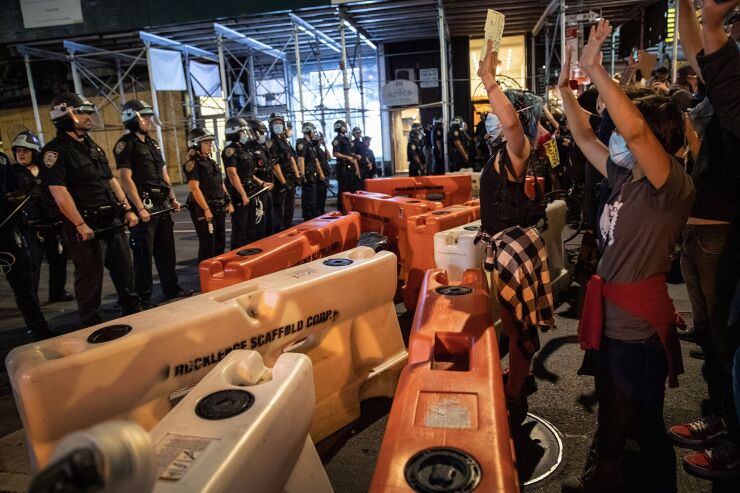Many credit unions have found themselves in the crossfires as some peaceful demonstrations have turned violent.
Protests in Minneapolis erupted last week after George Floyd, a black man, died in police custody. That’s led to both peaceful, and at times destructive, demonstrations across the United States.
Now credit union leaders have to grapple with fixing property damage, ensuring employee safety and addressing the weighty issue of race in America.
“Whatever we’re going through — the minor inconveniences in adjusting our schedule and making whatever repairs to our facilities, it pales in comparison to the broader social issues across our country that sparked the unrest and the protests to begin with,” said Ed Connelly, chief financial officer at Signal Financial Federal Credit Union in Kensington, Md.
The $431 million-asset credit union sustained damage, primarily broken windows, to its City Center branch in Washington, D.C. Additionally, the landlord for Signal Financial’s Capitol Hill branch building also took precautions by boarding up its windows with plywood given the location’s proximity to protests that happened over the weekend, but those materials should be removed soon.
Signal Financial does not have a timeframe for when its affected branch will reopen since it’s likely that glass replacements will be in high demand due to damage sustained by other businesses. It is currently in the process of filing a claim with its insurance provider to cover the costs.

State Employees' Credit Union in Raleigh, N.C., did not have to board up any of its branches or operation centers, but four of its ATMs were vandalized. No money was stolen, according to CEO Mike Lord. Management hopes that a curfew imposed by the city’s mayor from 8 p.m. to 5 a.m. will help curb the destruction.
“These measures are expected to impact the looting and vandalism while allowing the protesters an opportunity to voice their concerns,” Lord said.
Some credit unions are increasing security at least temporarily to deal with the protests. Institutions in D.C. and Maryland are taking precautions such as adding security guards at locations and shortening hours to create a safer environment for members and employees,
said John Bratsakis, president and CEO of the Maryland and District of Columbia Credit Union Association.
Ukrainian Federal Credit Union in Rochester, N.Y., is increasing the hours of security guards at some of its 13 locations, even though it hasn’t been directly impacted by the protests, said CEO Oleg Lebedko.
Alliance Credit Union in Ferguson, Mo.,
“It was a mix of demonstrators, police officers and local ministers and clergy who would all park there,” said Frank Evans, vice president of human resources. “I think that helped provide a sense of credit union grounds as a safe space and I think that played a large part in the fact that our building was not damaged.”
Management should communicate with staff frequently that they are monitoring the situation as it unfolds and are taking necessary precautions, experts said. That was a big takeaway that the $324 million-asset Alliance learned from the Ferguson riots. Management also reviewed its security plans after those events, though it didn’t make many changes.
“We looked, you always look, especially when everything is done and the raw emotion has dissipated somewhat,” Evans said.
Credit union executives are also concerned about damage to branches, other property and vaults being compromised right now, said Carlos Molina, senior risk consultant within CUNA Mutual Group’s risk and compliance solutions department. They should ensure that fire suppression equipment, sprinkler mechanisms and intruder alert systems are all functioning properly.
Credit unions are relatively secure due to the nature of the business of handling large amounts of cash, but those precautions are in place to prevent robberies, meaning their locations can still be vulnerable.
“[I]f suddenly you have a mob of folks or a lot of individuals approaching a credit union during business hours — after hours is a different risk — and they start to damage vehicles, light fire to vehicles, start throwing things through windows, and do things like that to the branch, obviously those are significantly different from your traditional robbery,” Molina said.
Security issues are complicated by the fact that many branches have been closed or have offered limited access to members for a prolonged period of time due to the coronavirus. That means normal checks of sprinkler and alarm systems and smoke detectors were perhaps neglected.
Now as credit unions begin returning to normal service, management should ensure everything is functioning, especially for a location in an older building, experts said.
Finally, credit union leaders are also having to handle the human aspect of Floyd’s death and how it highlights difficult issues, such as police conduct and racial tensions in the United States.
Jim Nussle, president and CEO of the Credit Union National Association, denounced systematic racism in both a statement and a series of social media posts.
Rodney Hood, chairman of the National Credit Union Administration,
“It’s important for us to join [Hood] in lending our voices to the national discussion about what is going on across the country and what change is needed so that we seek out and be a part of the positive changes [...] that’s needed for changing this country,” Signal Financial’s Connelly said. “That’s the most important discussion that we can be a part of. The rest of it, getting back to business, will fix itself.”
“Don’t be silent,” Connelly added.





